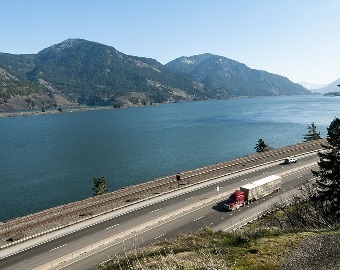There is interest in locally and renewably produced hydrogen
The Oregon Department of Transportation Climate Office has announced the release of a 50 page
Hydrogen Pathway Study, in an effort to understand and prepare Oregon for hydrogen fuel cell electric vehicles over the next 15 years.
The agency identifies five takeaways from the study:
- Hydrogen fuel cell electric vehicles technology is viable and more affordable every year. FCEVs have several advantages over battery-electric technology, and costs continue to drop. FCEVs could be a boon for transportation sectors that are harder to decarbonize, like long-haul trucking or long-distance transit routes.
- Oregon climate change policy supports FCEVs, and so does private industry. Industry interest in FCEVs and hydrogen production is high; however hydrogen FCEVs are not commercially available in Oregon and there are no existing retail hydrogen fuel stations.
- Oregon can take steps to develop the market for hydrogen and FCEVs. We can support industry-led demonstration and pilot projects, coordinate a regional hydrogen highway corridor, and establish a statewide hydrogen planning effort.
- Oregon should regularly assess the evolving hydrogen market. This awareness will allow Oregon to more effectively plan for a future hydrogen fuel cell market.
- Collaboration matters. ODOT is one player among many in the hydrogen space. Partnerships with neighboring states, industry players, public and private fleets, utilities and nonprofits will be key.
According to ODOT, the goal of this Study is to inform future efforts in Oregon by providing an overview of current hydrogen activities in the light-duty, medium-duty, and heavy-duty transportation sectors today, the requirements and estimated capital costs of building out a hydrogen fueling station network to meet state goals, and recommendations that Oregon might consider to support an evolving hydrogen
market going forward.
As in the earlier TEINA study, upstream hydrogen production and delivery, though a critical consideration in developing an overall hydrogen strategy, is not addressed in this study. The Oregon Department of Energy is currently conducting a parallel study, due to the state legislature by September 2022, of the benefits and barriers to the production and consumption of renewable hydrogen in Oregon.
A D V E R T I S E M E N T

A D V E R T I S E M E N T
This Study found a supportive policy landscape in Oregon, where hydrogen and fuel cell vehicles are recognized in state goals, clean vehicle rebates and clean fuels credit programs. There is broad stakeholder interest in locally and renewably produced hydrogen. There is also growing fleet and utility interest in opportunities and potential solutions offered by both hydrogen and fuel cell electric vehicles. Among other activities in Oregon, this Study describes the hydrogen-related efforts of TriMet -- the Portland area transit system, Eugene Water & Electric Board, and Daimler Trucks North America.
Fleet operators seem to be coalescing around a common interest in finding zero-emission solutions to the more challenging on-road mobility use cases, including longer transit bus routes, fleets with continuous 24/7 operations, and long-haul trucking. Where battery technology today can quite easily solve most mobility needs, these challenging scenarios are causing fleets to investigate potential hydrogen fuel cell solutions.
--Staff Reports| Post Date: 2022-05-19 13:19:39 | Last Update: 2022-05-17 18:22:39 |







